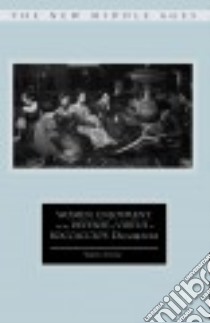Women, Enjoyment, and the Defense of Virtue in Boccaccio's Decameron - 9781137490551
Un libro in lingua di Valerio Ferme edito da Palgrave Macmillan, 2015
- € 84.20
- Il prezzo è variabile in funzione del cambio della valuta d’origine
"Readers will enjoy Ferme's attention to the big picture of the Decameron, including his comprehensive interpretation of the book at all three of its narrative levels. Ferme highlights the tussle in the first half of the book between the authority of women and the limits put on them by society. He is particularly engaging as he explores the dialectic between enjoyment and virtue, transgression and decorum, played out in the form and content of Decameron storytelling."
---F. Regina Psaki, The Giustina Family Professor of Italian Language and Literature, University of Oregon, USA
"Through an engaging and thorough analysis of the three main components of the Decameron (Proem, overarching story, and tales), Ferme redesigns the interpretation of Boccaccio's narrative patterns, while establishing a critical conversation with notable scholars (Branca, Almansi, Segre, Getto, and Baratto). The collection of stories risks turning the book into a Galeotto, this study argues, when the salacious plots seem to produce inappropriate relations in the brigata, but the amicable conflicts between its men and women end up providing `honest enjoyment' for women in love instead."
---Alessandro Vettori, Professor of Italian and Comparative Literature, Rutgers University, USA
Discussing the narrative frame of Boccaccio's famed Decameron, this book shows that Boccaccio's female characters employ storytelling as the "honest" entertainment with which to banish the melancholy engendered by the Black Plague, even as it helps them avoid the shameful behavior embraced by other Florentine women. This "honest" defense of their honor is challenged by the sexually explicit stories narrated by their male companions, who gradually suggest the desire to move from words to action in the overarching narrative. Through an analysis of the dynamics between the women who rule most of the first half of the Decameron and their male counterparts, this book provides novel ways in which to read Boccaccio's masterpiece within the context of late medieval society.
Informazioni bibliografiche
- Titolo del Libro in lingua: Women, Enjoyment, and the Defense of Virtue in Boccaccio's Decameron
- Lingua: English
- Autore: Valerio Ferme
- Editore: Palgrave Macmillan
- Collana: Palgrave Macmillan (Hardcover)
- Data di Pubblicazione: 04 Giugno '15
- Genere: LITERARY CRITICISM
- Argomenti : Women in literature Storytelling in literature Virtue in literature
- Pagine: 248
- Dimensioni mm: 215 x 139 x 0
- ISBN-10: 1137490551
- EAN-13: 9781137490551


